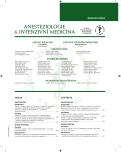-
Medical journals
- Career
Transcranial Doppler and coloured duplex ultrasonography in intensive care medicine
Authors: Dobiáš Miloš
Authors‘ workplace: Klinika anesteziologie, resuscitace a intenzivní medicíny, 1. LF UK a Všeobecná fakultní nemocnice, Praha
Published in: Anest. intenziv. Med., 25, 2014, č. 5, s. 378-382
Category: Postgraduate education - ECHO didactics
Sources
1. Aaslid, R., Markwalder,T. M., Nornes, H. Noninvasive transcranial Doppler ultrasound recording of flow velocity in basal cerebral arteries. J. Neurosurg., 1982, 57, p. 769–774.
2. Školoudík, D., Škoda, O., Bar, M., Václavík, D., Brozman, M. Neurosonologie. Praha: Galén, 2003, s. 147–198.
3. Bleck, T. P. Rebleeding and vasospasm after SAH: New strategies for improving outcome. J. Crit. Illn., 1997, 12, p. 572–582.
4. Lindegaard, K. F., Nornes, H., Bakke, S. J. et al. Cerebral vasospasm diagnosis by means of angiography and blood velocity measurements. Acta Neurochir. (Wien), 1989, 100, p. 12–24.
5. Aaslid, R., Markwalder,T. M., Nornes, H. Noninvasive transcranial Doppler ultrasound recording of flow velocity in basal cerebral arteries. J. Neurosurg., 1982, 57, p. 769–774.
6. Školoudík D, Herzig R. Stenózy intrakraniálních tepen – možnosti diagnostiky pomocí transkraniální duplexní sonografie. Neurol. pro praxi, 2007; 8, 4, p. 208–212.
7. Kuliha M, Roubec M, Školoudík D. Sonotrombolýza – mechanizmus účinku a její využití v léčbě ischemické cévní mozkové příhody. Cesk. Slov. Neurol. N., 2012, 75/108, 1, p. 23–29.
8. Lee, J. H., Kelly, D. F., Oertel, M. et al. Carbon dioxide reactivity, pressure autoregulation, and metabolic suppression reactivity after head injury: A transcranial Doppler study. J. Neurosurg., 2001, 95, p. 222–232.
9. Klingelhöfer, J., Dander, D., Holzgraefe, M., Bischoff, C., Conrad, B. Cerebral vasospasm evaluated by transcranial Doppler ultrasonography at different intracranial pressures. J. Neurosurg., 1991, 75, 5, p. 752–758.
10. Steiner, L. A., Balestreri, M., Johnston, A. J. et al. Sustained moderate reductions in arterial CO2 after brain trauma timecourse of cerebral blood flow velocity and intracranial pressure. Intensive Care Med., 2004, 30, p. 2180–2187.
11. Lee, J. H., Kelly, D. F., Oertel, M. et al. Carbon dioxide reactivity, pressure autoregulation, and metabolic suppression reactivity after head injury: A transcranial Doppler study. J. Neurosurg., 2001, 95, p. 222–232.
12. Dosemeci, L., Dora, B., Yilmaz, M. et al. Utility of transcranial Doppler ultrasonography for confirmatory diagnosis of brain death: Two sides of the coin. Transplantation, 2004, 77, p. 71–75.
Labels
Anaesthesiology, Resuscitation and Inten Intensive Care Medicine
Article was published inAnaesthesiology and Intensive Care Medicine

2014 Issue 5-
All articles in this issue
- Theophylline poisoning – case report and review of literature
- New direct oral anticoagulants (NOAC) – solutions to potential problems with coagulation assessment
- Delayed manifestation of traumatic diaphragmatic rupture – case report
- Transcranial Doppler and coloured duplex ultrasonography in intensive care medicine
- Ventricular interdependence: Even the best neighbours can fall out
- Triage strategy for urgent management of cardiac tamponade
- Recommendation for analgesia and sedation of adult patients in intensive care
- Compensation for non-material damage (damage to health) according to the new Civil Code
- OBAAMA-CZ group: Anaesthesia for minor surgery in the postpartum period – Czech prospective national survey
- Management of anaesthesia in a parturient with acute aorticdissection
- Perioperative management of Caesarean Section in a parturient with Marfan syndrome – case report and systemic review of literature
- Anaesthesiology and Intensive Care Medicine
- Journal archive
- Current issue
- Online only
- About the journal
Most read in this issue- New direct oral anticoagulants (NOAC) – solutions to potential problems with coagulation assessment
- Theophylline poisoning – case report and review of literature
- Recommendation for analgesia and sedation of adult patients in intensive care
- Triage strategy for urgent management of cardiac tamponade
Login#ADS_BOTTOM_SCRIPTS#Forgotten passwordEnter the email address that you registered with. We will send you instructions on how to set a new password.
- Career

